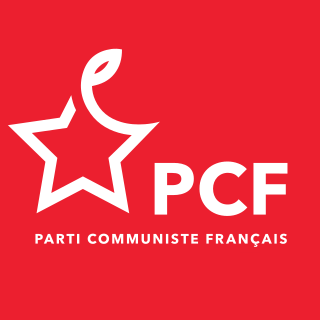
The Democratic Party of Côte d'Ivoire — African Democratic Rally is a political party in Côte d'Ivoire.
Aimé Henri Konan Bédié is an Ivorian politician. He was President of Côte d'Ivoire from 1993 to 1999, and he is currently the President of the Democratic Party of Côte d'Ivoire - African Democratic Rally (PDCI-RDA).

Entente of Independents of Côte d'Ivoire, a splinter group of the Democratic Party of Côte d'Ivoire (PDCI). EDICI was founded in Abidjan in the end of 1949. It was led by Vamé Doumouya and Touré Amidou. In the beginning of 1950 the Union of Independents of Côte d'Ivoire (UICI) merged into EDICI.

Union of Independents of Côte d'Ivoire, a splinter group of the Democratic Party of Côte d'Ivoire (PDCI). EDICI was founded in Bouaké in the end of 1949. It was led by N'Dia Koffi Blaise and Mansilla Leopold. In the beginning of 1950 UICI merged into the Entente of Independents of Côte d'Ivoire.
General Workers Union in Côte d'Ivoire, a national trade union federation in Côte d'Ivoire. UGTCI was created in 1962 by PDCI, and was to become the sole legal trade union centre of the country for many years.

Simeon Aké was an Ivorian politician.

General elections were held in Ivory Coast on 27 November 1960 to elect a President and National Assembly. Under the constitution enacted that year, the country was officially a one-party state with the Democratic Party of Côte d'Ivoire – African Democratic Rally (PDCI-RDA) as the sole legal party. Its leader, Félix Houphouët-Boigny, was automatically elected to a five-year term as president and unanimously confirmed in office via a referendum. A single list of PDCI-RDA candidates won all 70 seats in the National Assembly. Voter turnout was 95.9% in the parliamentary election and 98.8% in the presidential election.

General elections were held in Ivory Coast on 7 November 1965 to elect a President and National Assembly. At the time the country was a one-party state with the Democratic Party of Côte d'Ivoire – African Democratic Rally (PDCI-RDA) as the sole legal party. Its leader Félix Houphouët-Boigny was elected President unopposed, whilst the PDCI-RDA won all 85 seats in the National Assembly. Voter turnout was 99.6%.

General elections were held in Ivory Coast on 29 November 1970 to elect a President and National Assembly. At the time the country was a one-party state with the Democratic Party of Côte d'Ivoire – African Democratic Rally (PDCI-RDA) as the sole legal party. Its leader Félix Houphouët-Boigny was elected President unopposed, whilst in the National Assembly election, a list of 100 PDCI-RDA candidates for the 100 seats was presented to the electorate for approval. Voter turnout was reported to be 98.9% in the parliamentary election and 99.2% in the presidential election.

General elections were held in Ivory Coast on 16 November 1975 to elect a President and National Assembly. At the time the country was a one-party state with the Democratic Party of Côte d'Ivoire – African Democratic Rally (PDCI-RDA) as the sole legal party. Its leader Félix Houphouët-Boigny was elected President unopposed, whilst in the National Assembly election the PDCI-RDA won all 120 seats. Voter turnout was reported to be 99.3% in the parliamentary election and 99.8% in the presidential election.

Parliamentary elections were held in Ivory Coast on 10 November 1985. At the time the country was a one-party state with the Democratic Party of Côte d'Ivoire – African Democratic Rally (PDCI-RDA) as the sole legal party. 546 PDCI-RDA candidates contested the 175 seats. Voter turnout was reported to be just 45.7%.

Parliamentary elections were held in Ivory Coast on 25 November 1990, the first since the restoration of multi-party democracy earlier in the year. Although 17 of the 25 legalised parties ran in the election, nearly half of the 490 candidates were from the former sole legal party, the Democratic Party of Côte d'Ivoire – African Democratic Rally (PDCI). The PDCI won a landslide victory, taking 163 of 175 seats on 71.7 percent of the vote. Only two other parties got into the legislature, winning just 12 seats between them. Voter turnout was reported to be around 40%.

Parliamentary elections were held in Ivory Coast on 26 November 1995. Ten parties and a number of independents contested the election, with the Rally of the Republicans and the Ivorian Popular Front running under the Republican Front banner. The result was a victory for the ruling Democratic Party of Côte d'Ivoire – African Democratic Rally (PDCI-RDA), which won 148 of the 175 seats.
The African Regroupment Party was a political party in the French African colonies.

Jeannot Ahoussou-Kouadio is an Ivorian politician who was Prime Minister of Ivory Coast from March 2012 to November 2012. Previously he was Minister of Industry from 2002 to 2005 and Minister of Justice from 2010 to 2012.

The Vice President of the Republic of Ivory Coast, officially the Republic of Côte d'Ivoire, is the second-highest executive official in Ivory Coast. The Vice President, together with the President of Ivory Coast, is directly elected by the people through popular vote to serve a five-year term of office. The Vice President is the first person in the presidential line of succession and would ascend to the presidency upon the death or resignation of the President, or an absolute vacancy in the office. President Alassane Ouattara appointed Daniel Kablan Duncan as Vice President in January 2017 after the 2016 Constitution was enacted.







